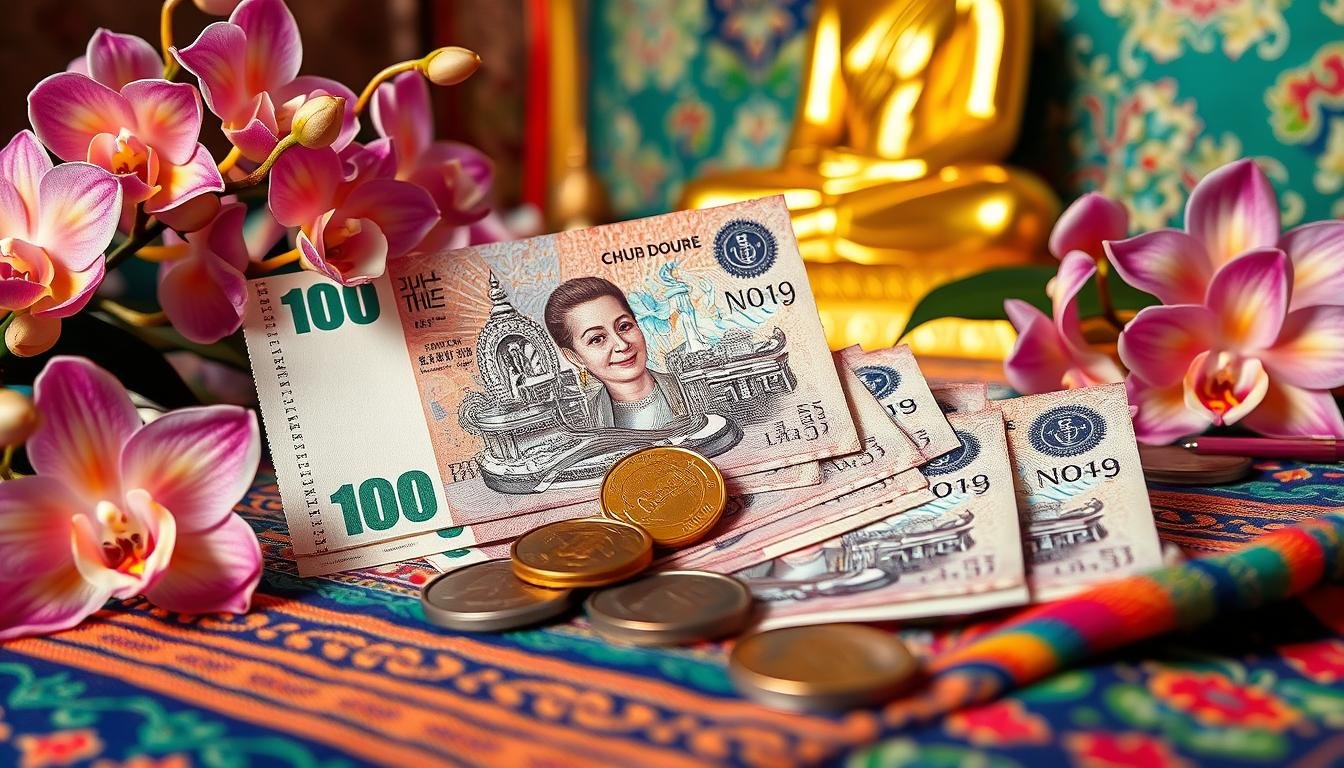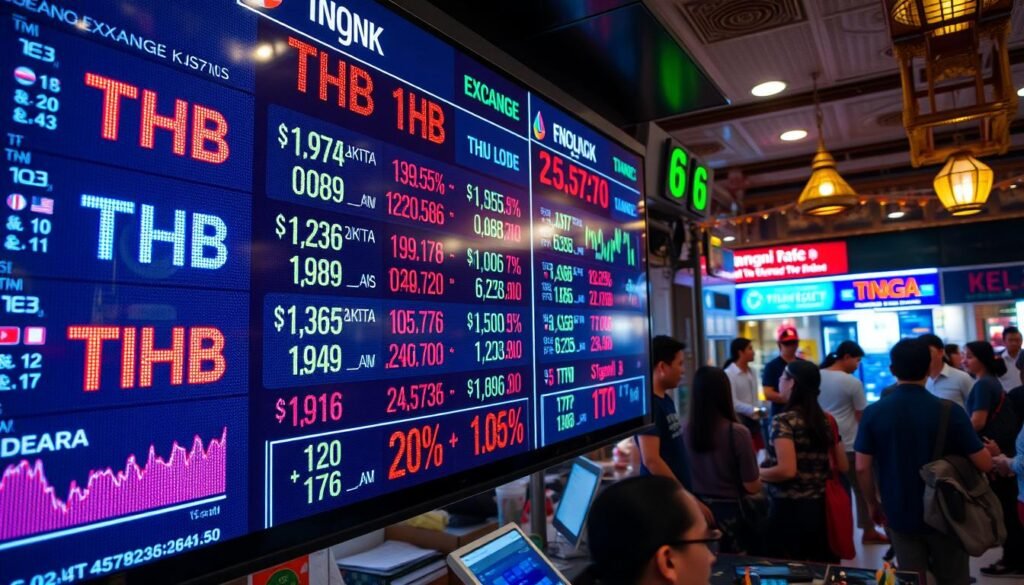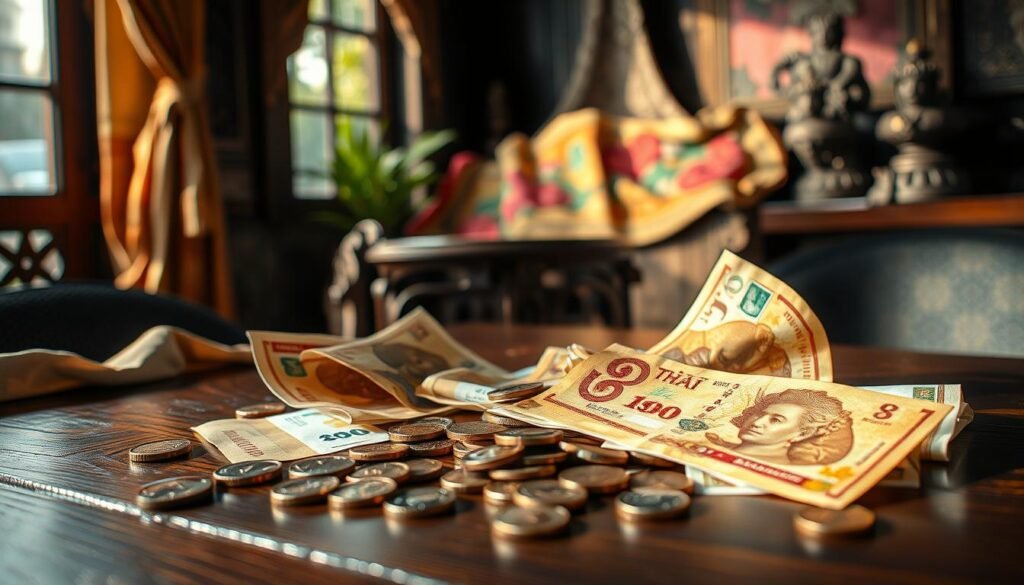
When planning your trip to Thailand, it’s key to know the local currency. The Thai baht is the official money, marked by ฿ and the code THB1. It’s the main currency in Thailand. Travelers and expats must grasp how to use it, as it’s split into 100 satang, but these are rarely seen due to their small value1.
You’ll need to figure out how to exchange money, use credit cards and ATMs, and steer clear of currency scams. Knowing about Thailand’s currency will enhance your trip, helping you budget better. The Thai baht comes in bills of 20, 50, 100, 500, and 1,000 THB2. It’s accepted in big businesses, hotels, and restaurants.
Understanding Thailand’s currency and how to use it will make your trip more enjoyable. Knowing what currency Thailand uses will help you plan your expenses. The official currency of Thailand is the baht, which can be divided into 100 satang2. It’s widely accepted in larger businesses, hotels, and restaurants in Thailand.
Key Takeaways
- The Thai baht is the official currency of Thailand, and it’s essential for travelers and expats to understand how to use it.
- The Thai baht is divided into 100 satang, which are rarely used in daily commerce due to their low value1.
- The Thai baht bills in circulation include denominations of 20, 50, 100, 500, and 1,000 THB2.
- Credit and debit cards are widely accepted in larger businesses, hotels, and restaurants in Thailand, with some smaller establishments preferring cash payments2.
- ATM withdrawals in Thailand may incur charges from both the home bank and the local ATM operator, so travelers should be aware of possible fees and preferred currency conversion options2.
- Western Union allows sending money from Thailand to over 200 countries and territories1.
What Currency Does Thailand Use?
The official currency in Thailand is the thai baht, with a history dating back to the 15th century3. Knowing about the thai baht is key for anyone visiting Thailand. It helps you understand the local economy and enjoy your trip more. The thai baht is split into 100 satang4. Common banknotes in Thailand are ฿20, ฿50, ฿100, ฿500, and ฿10004.
To get the best exchange rate, use a thai currency converter5. In July 2024, 1 USD was worth 36.5 THB5. You can exchange money at banks, exchange booths, or hotels. But, the rates can differ. Major credit cards like Visa and Mastercard are widely accepted in Thailand3.
Using ATMs in Thailand is also easy, but you might face fees from both your bank and the local provider3. The cost of living in Thailand varies. Hotel prices range from about ฿600 to ฿3000 (20 to 100 USD)5. Eating out in mid-range restaurants for two can cost between 500 to 2000 THB (13.6 to 54.3 USD)5.
Understanding Thai Money Exchange Rates
Traveling to Thailand means knowing the baht exchange rate to save money. The rate changes, so staying updated is key6. Use a currency converter or talk to a financial expert to make smart exchange decisions.
To find the best exchange rate, go to a trusted exchange service or ATM. Some places might say they have no fees, but check the rate they offer7. You can also use a card to get money from an ATM, but watch out for fees8.
Here are some tips for exchanging money in Thailand:
- Choose a reputable exchange service or ATM for the best rate.
- Stay away from hotel exchange services or ATMs in remote spots.
- Carry a mix of cash and cards, keeping big amounts in hotel safes.
By understanding Thai money exchange rates and following these tips, you can enjoy your trip to Thailand. You’ll have a worry-free time with your money6.
| Currency | Exchange Rate |
|---|---|
| 1 USD | 30 THB6 |
| 1 EUR | 35 THB6 |
Where to Exchange Money in Thailand

Traveling to Thailand means you need to know where to exchange your money. You can choose from banks, exchange booths, airports, and hotels9. shows that local exchange offices usually have better rates than ATMs.
In Thailand, you’ll find many places to exchange currency. SuperRich International Exchange, Vasu Exchange Bangkok, and The Twelve Victory have branches all over the country10. They might give you better rates than airports and hotels. But, always compare rates and fees before you decide.
Here are some places to consider:
- Banks: They might give you lower exchange rates than other places in Thailand9.
- Exchange booths: They offer good rates, but rates can vary a lot9.
- Airports and hotels: They usually have the worst rates and higher fees9.
Also, hidden fees can cut down how much money you get when exchanging currency in Thailand9. Look for places with clear fee structures to save money on your thai baht.
Using Credit Cards and ATMs in Thailand
Traveling to Thailand means knowing how to handle your thailand money. Credit cards and ATMs are everywhere, making it easy to manage your cash11. Visa and Mastercard are common in cities and tourist spots11.
To save money, pick a card with no foreign fees. Banks like Aeon Bank, Bangkok Bank, and Siam Commercial Bank are good for international users11. Also, use a thai currency converter for the best rates.
Here are some tips for using ATMs in Thailand:
- Take out big amounts less often to cut down on fees11
- Choose to be charged in Thai baht (THB) to avoid higher exchange fees11
- Keep an eye on your account and report any odd transactions right away11
Tell your bank you’re traveling to avoid card issues. With the right info, you can handle your currency in thailand smoothly and enjoy your trip12.
By following these tips, you can have a great time in Thailand without money worries. Always watch your thailand money and use a trusted thai currency converter for the best rates11.
Common Currency Scams to Avoid

Traveling to Thailand means being smart about money. Be careful when exchanging your money for Thai baht. Scams can take your money, leaving you with less than you expected13. Watch out for tuk-tuk and taxi scams, where drivers take you to shops for a commission14.
Jet ski and scooter scams involve overcharging for damages or faulty vehicles. Wrong change scams can confuse tourists, giving them less money back13. Money exchange scams use fake rates and old bills in tourist areas14.
To stay safe, learn to spot real money and get good exchange rates. Use trusted exchange services and keep your valuables safe13. Knowing these scams helps you enjoy Thailand without money worries.
Counterfeit Money Tips
To spot fake money, check for security features like watermarks and threads13. Use a counterfeit detector pen to confirm your notes are real.
Exchange Rate Tricks
Always check exchange rates and fees before exchanging money14. Use online converters to estimate rates and avoid hidden fees.
Safe Transaction Practices
Choose reputable exchange services and keep valuables secure13. Use credit or debit cards with zero liability protection for safe transactions.
Digital Payment Methods in Thailand
Traveling to Thailand means understanding digital payment options. This includes thai currency converter tools and services for easy thailand money exchange. Over 72% of regional fintech companies aim to offer smart money transfer solutions in Thailand15. This digital payment shift makes managing thai money easier for tourists.
Mobile payments and online banking are popular in Thailand. Services like Wise offer low fees and competitive exchange rates, helping avoid international fees16. The Wise account supports 40+ currencies, useful for frequent thailand money exchanges.
Even though digital payments are growing, cash is widely accepted in Thailand. Cash payments account for over 80% of transactions16. Yet, contactless card payments and thai currency converter tools are making cash less necessary.
For a great trip to Thailand, mix cash and digital payments. This flexibility allows easy payments, whether using a thai currency converter or exchanging thailand money at a bank.
Tipping and Payment Customs in Thailand
Traveling to Thailand means knowing about local tipping and payment customs. Tipping is not required but shows appreciation for good service. It’s common to tip around 10% of the bill when using thai money or thailand currency, like the thai baht.
In the service industry, tipping expectations can differ. Tour guides should get about 10% of the tour cost17. Spa staff, like massage therapists, usually receive 15% of the total17. A tip calculator can help figure out the right amount.
Thailand is mostly a cash-based society, but card payments are growing, mainly in tourist spots and big hotels18. When tipping, give it discreetly and say thank you in Thai17. Knowing and following these customs makes your trip more enjoyable and stress-free, using your thai money or thailand currency wisely.
Managing Your Money While Traveling in Thailand
When you’re in Thailand, it’s key to know how to get thai baht if you need more money19. It’s smart to understand the exchange rates and fees of different services. The thailand money exchange rates can change, so keeping up is important20.
To handle your money well, think about using a thai currency converter for the best rates21. Credit and debit cards are also widely accepted in Thailand, but cash is needed for many things19. ATMs are easy to find, but watch out for withdrawal fees, which can be 200-250 THB for foreign cards20.
Here are some tips for managing your money in Thailand:
- Take out big amounts of money at once to avoid ATM fees20
- Use a secure and reliable thai currency converter for the best rates21
- Stay away from bad exchange rates at hotels or guesthouses19
By following these tips and staying informed about thailand money exchange rates, you can manage your money well. This way, you can fully enjoy your trip to Thailand19.
Conclusion: Making the Most of Your Thai Currency Experience
To get the most out of your Thai currency experience, knowing the Thai baht22 is key. Also, getting used to local payment ways is important. Plan well and use the right services for a smooth, affordable trip in Thailand.
Use travel debit cards like Wise or Revolut to skip foreign transaction fees and get good exchange rates22. Always pay in Thai baht to avoid extra charges22.
With some prep and knowledge of the Thai money system, you’re ready to enjoy your trip. You’ll have more time to explore and have fun2223.
FAQ
What currency does Thailand use?
What is the history of the Thai baht?
What are the denominations of the Thai baht?
How can I get the best exchange rates for the Thai baht?
Where can I exchange money in Thailand?
Can I use credit cards and ATMs in Thailand?
What are some common currency scams to avoid in Thailand?
What digital payment methods are available in Thailand?
What are the tipping and payment customs in Thailand?
How can I manage my money while traveling in Thailand?
Source Links
- A Guide to Currency in Thailand: The Baht – Blog | Western Union – https://www.westernunion.com/blog/en/au/a-guide-to-currency-in-thailand-the-baht/
- Money and currency in Thailand – https://wise.com/us/blog/money-and-banks-in-thailand
- What is the Currency in Thailand? | Travel Guide – https://www.travelex.co.uk/travelex-hub/travel-guides/thailand/what-currency-in-thailand
- Thai baht – https://en.wikipedia.org/wiki/Thai_baht
- How to Exchange Thai Baht – https://www.odynovotours.com/thailand/currency-thai-baht.html
- Essential Money Tips for Thailand: Currency, Exchange Rates, and More – https://www.baansuaybantai.com/blog/b/money-matters-thailand
- Thai Baht (THB) – https://corporatefinanceinstitute.com/resources/foreign-exchange/thai-baht-thb/
- What You Need to Know About Currency in Thailand – https://www.smoney.com.au/blog/currency-in-thailand/
- How To Find the Best Exchange Rate in Thailand | Western Union – https://www.westernunion.com/blog/en/au/how-to-find-the-best-exchange-rate-in-thailand/
- Money Exchange Bangkok – https://www.traveloka.com/en-en/explore/destination/money-exchange-bangkok-trp/368692
- Using your debit card in Thailand: a complete cash, card, and ATM guide for your trip – https://n26.com/en-fr/using-card-in-thailand
- Money in Thailand: Banks, ATMs, cards & currency exchange – https://wise.com/gb/blog/money-and-banks-in-thailand
- Common Scams in Thailand – https://library.siam-legal.com/common-scams-in-thailand/
- 11 Tourist Scams in Thailand and How to Avoid Them – https://www.godigit.com/international-travel-insurance/tourist-scams/tourist-scams-in-thailand
- The Most Popular Payment Methods in Thailand – https://www.rapyd.net/blog/the-most-popular-thailand-payment-methods/
- Cash or card in Thailand: Which is the best way to pay? – https://wise.com/gb/blog/cash-or-card-in-thailand
- Tipping in Thailand – Is it Customary to Tip in Thailand? – https://crowncurrency.com.au/travel-tips/tipping-thailand
- Guide to Tipping in Thailand – Where, When and How Much to Tip – https://iamkohchang.com/blog/tipping-in-thailand.html
- Travel money guide: Thailand – https://www.finder.com/travel-money/thailand
- How Best to Manage your Money in Thailand – https://www.weswap.com/blog/money/manage-money-thailand/
- why thailand detail – https://www.thailandprivilege.co.th/why-thailand/banking-and-finances-for-foreign-expatriates-in-thailand
- Currency in Thailand: A Full Guide 2024 – https://www.thecurrencyshop.co.nz/guides/currency-in-thailand
- Currency In Thailand: All Useful Information For Your Trip To Thailand – https://autourasia.com/currency-in-thailand-all-useful-information-for-your-trip-to-thailand-b621.html







So, with the fluctuating Thai money exchange rates, wouldnt it be wiser to carry USD instead?
Interesting read, but did the author consider discussing the impact of digital currency on Thailands economy? Just food for thought.
Interesting read but why not discuss digital payment options? Many tourists now use apps and cards more than cash.
Does anyone else think that the Thai Bahts strength might significantly impact tourism in Thailand? Lets discuss.